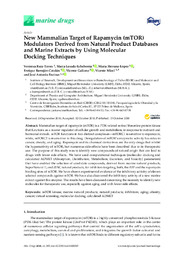Por favor, use este identificador para citar o enlazar este ítem:
https://hdl.handle.net/11000/30652Registro completo de metadatos
| Campo DC | Valor | Lengua/Idioma |
|---|---|---|
| dc.contributor.author | Ruiz-Torres, Veronica | - |
| dc.contributor.author | Losada-Echeberría, María | - |
| dc.contributor.author | Herranz-Lopez, Maria | - |
| dc.contributor.author | Barrajón-Catalán, Enrique | - |
| dc.contributor.author | Galiano, Vicente | - |
| dc.contributor.author | Micol, Vicente | - |
| dc.contributor.author | Encinar, José Antonio | - |
| dc.contributor.other | Departamentos de la UMH::Bioquímica y Biología Molecular | es_ES |
| dc.date.accessioned | 2024-01-26T08:58:32Z | - |
| dc.date.available | 2024-01-26T08:58:32Z | - |
| dc.date.created | 2018-10-12 | - |
| dc.identifier.citation | Marine Drugs 16(10), 2018, 385 | es_ES |
| dc.identifier.issn | 1660-3397 | - |
| dc.identifier.uri | https://hdl.handle.net/11000/30652 | - |
| dc.description.abstract | Mammalian target of rapamycin (mTOR) is a PI3K-related serine/threonine protein kinase that functions as a master regulator of cellular growth and metabolism, in response to nutrient and hormonal stimuli. mTOR functions in two distinct complexes—mTORC1 is sensitive to rapamycin, while, mTORC2 is insensitive to this drug. Deregulation of mTOR’s enzymatic activity has roles in cancer, obesity, and aging. Rapamycin and its chemical derivatives are the only drugs that inhibit the hyperactivity of mTOR, but numerous side effects have been described due to its therapeutic use. The purpose of this study was to identify new compounds of natural origin that can lead to drugs with fewer side effects. We have used computational techniques (molecular docking and calculated ADMET (Absorption, Distribution, Metabolism, Excretion, and Toxicity) parameters) that have enabled the selection of candidate compounds, derived from marine natural products, SuperNatural II, and ZINC natural products, for inhibitors targeting, both, the ATP and the rapamycin binding sites of mTOR. We have shown experimental evidence of the inhibitory activity of eleven selected compounds against mTOR. We have also discovered the inhibitory activity of a new marine extract against this enzyme. The results have been discussed concerning the necessity to identify new molecules for therapeutic use, especially against aging, and with fewer side effects. | es_ES |
| dc.format | application/pdf | es_ES |
| dc.format.extent | 24 | es_ES |
| dc.language.iso | eng | es_ES |
| dc.publisher | MDPI | es_ES |
| dc.rights | info:eu-repo/semantics/openAccess | es_ES |
| dc.rights | Attribution-NonCommercial-NoDerivatives 4.0 Internacional | * |
| dc.rights.uri | http://creativecommons.org/licenses/by-nc-nd/4.0/ | * |
| dc.subject | mTOR kinase | es_ES |
| dc.subject | marine natural products | es_ES |
| dc.subject | natural products | es_ES |
| dc.subject | inhibitors | es_ES |
| dc.subject | aging | es_ES |
| dc.subject | obesity | es_ES |
| dc.subject | cancer | es_ES |
| dc.subject | virtual screening | es_ES |
| dc.subject | molecular docking | es_ES |
| dc.subject | calculated ADMET | es_ES |
| dc.subject.classification | Bioquímica y Biología Molecular | es_ES |
| dc.subject.other | CDU::5 - Ciencias puras y naturales::57 - Biología::577 - Bioquímica. Biología molecular. Biofísica | es_ES |
| dc.title | New Mammalian Target of Rapamycin (mTOR) Modulators Derived from Natural Product Databases and Marine Extracts by Using Molecular Docking Techniques | es_ES |
| dc.type | info:eu-repo/semantics/article | es_ES |
| dc.relation.publisherversion | https://doi.org/10.3390/md16100385 | es_ES |

Ver/Abrir:
10.3390_md16100385 (2).pdf
9,11 MB
Adobe PDF
Compartir:
 La licencia se describe como: Atribución-NonComercial-NoDerivada 4.0 Internacional.
La licencia se describe como: Atribución-NonComercial-NoDerivada 4.0 Internacional.
.png)